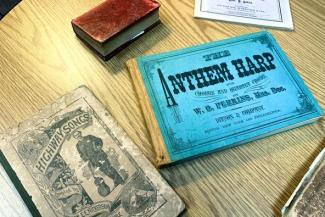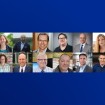Sounding Spirit Team, Including UK Libraries and Niles Center, Awarded NEH Grant for American Music Digital Library

The Sounding Spirit Digital Library team, which includes the University of Kentucky Libraries and the John Jacob Niles Center for American Music, as well as archival partners from five other institutions across the United States, has been awarded a third grant from the National Endowment for the Humanities (NEH) to further preserve and enhance engagement with historic Southern sacred songbooks.
This $346,781 grant from the NEH’s Humanities Collections and References Resources (HCRR) program will build on a successful one-year HCRR-funded planning project, which debuted a pilot digital library in 2020 comprised of 22 books from four partner institutions. Led by project director and editor-in-chief Jesse P. Karlsberg and managing editor and project manager Meredith Doster from the Emory Center for Digital Scholarship (ECDS), the team will increase the digital library’s holdings to include 1,284 additional hymnals and songbooks from the U.S. South published between 1850 and 1925.
Along with making sacred American music accessible to the public, the NEH grant will support the research and writing of 425 volume summaries, 100 collection descriptions and 15 bibliographic essays introducing readers to the many works and contributions of their authors.
The digital library will accompany Sounding Spirit’s five facsimile editions of sacred Southern vernacular songbooks made possible by an NEH Scholarly Editions and Translations grant awarded in 2018.
Sounding Spirit’s collaborative partners whose historical holdings complement the collection include:
- Emory’s University’s Pitts Theology Library and the Stuart A. Rose Manuscript, Archives, and Rare Book Library;
- Center for Popular Music at Middle Tennessee State University;
- Southern Baptist Theological Seminary Archives and Special Collections;
- Special Collections Research Center and William L. Clements Library at the University of Michigan; and
- Department of Special Collections and University Archives and Helmerich Center for American Research at the Gilcrease Museum at the University of Tulsa.
Expanding on the pilot digital library, UK musicology doctoral candidate Erin Fulton, a music bibliography and research associate, worked with Niles Center Director Revell Carr to select 169 hymnals and sacred songbooks from the University of Kentucky to be digitized as part of the project. In 2020, Fulton, in preparation for the next phase of the Sounding Spirit project, directed the compilation of the “Checklist of Southern Sacred Music Imprints, 1850-1925,” which assembles bibliographic data that will enhance the multi-institutional team’s abilities to research multiple facets of American sacred songbook publishing.
“This is a classic example of a great digital humanities project because it makes our collections of sacred hymnals and songbooks accessible to researchers within academia, as well as independent scholars and the public. For scholars in fields across the arts and humanities — music, religion, ethnic and racial studies, popular culture, American history, publishing history — this material has much to tell us about the American experience in the 19th century,” Carr said.
In late fall or early winter, the digitization team at the UK Libraries Special Collections Research Center (SCRC), led by Director of Digital Services Sarah Dorpinghaus, will begin digitizing the selected materials, most of which are part of the Niles Center’s collections housed in the Lucille Caudill Little Fine Arts Library.
“Collaborative projects, like Sounding Spirit, that leverage subject and technical expertise are crucial. We learn so much from working closely together to explore new ideas and techniques. Ultimately this results in more efficient workflows and tools behind the scenes and an improved digital access experience for the public,” Dorpinghaus said.
Dorpinghaus and UK Libraries’ senior image management specialist Crystal Heis will hire student assistants in early winter to help expand the project, digitizing approximately 30 books per month and transferring them in batches to the ECDS for upload into the Sounding Spirit Digital Library until the grant concludes in the summer of 2024.
Members of the Sounding Spirit team at the ECDS will then work to make these important texts freely available to the public on a site built using the ECDS’s state-of-the-art Readux platform, enhancing materials with metadata and descriptive entries that place each holding within its cultural context.
“Typically, these books are kept in temperature-controlled rooms and require researchers to visit the library in person, but we know from the experience of the last year that travel is not always possible,” said Carr. “Investing in the digitization of these collections makes the books readily accessible in a single website, with lots of additional commentary and search functions, which should provide rich returns in public scholarship in the future.”
Sounding Spirit was started by Karlsberg in 2018 in collaboration with the ECDS and Pitts Theology Library as a way to publish and give access to sacred songbooks of American music history and culture. The digital library supports multifaceted interactions with songbooks and hymnals underrepresented in research and archival holdings and is curated into collections that highlight people, places, genres and denomination.
The Sounding Spirit team invites audiences to begin exploring the inaugural collection of songbooks now through the digital library website.
More information on the Emory Center for Digital Scholarship’s projects, initiatives and partnerships is available on the ECDS Dashboard.
The John Jacob Niles Center for American Music is a collaborative research and performance center maintained by UK's College of Fine Arts, School of Music and UK Libraries.
As the premier research library in the Commonwealth, UK Libraries empowers lifelong learners to discover, create and connect by providing ever-expanding access to quality information and collaborating with academic and creative communities worldwide to advance knowledge, enhance scholarship, and preserve the history and culture of the Commonwealth. More information about UK Libraries can be found on its website.
The Sounding Spirit project has been made possible in part by a major grant from the National Endowment for the Humanities: Democracy demands wisdom.


